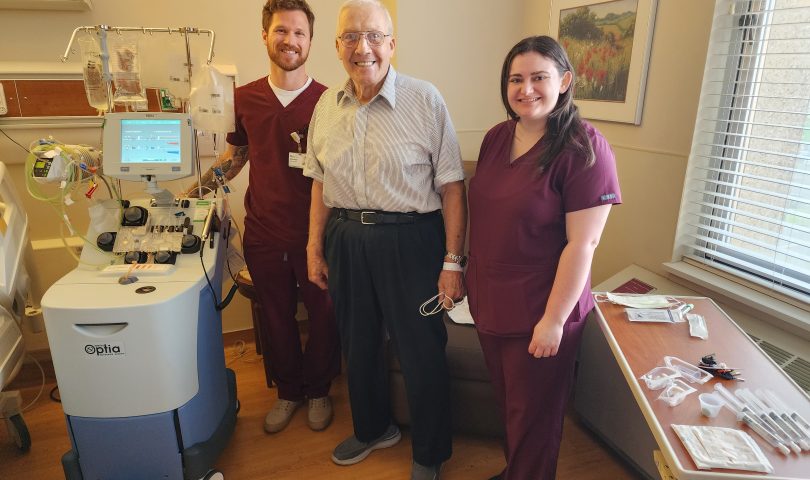MORGANTOWN – Mon Health System has begun offering a specialized prostate cancer immunotherapy treatment not available anywhere else in the state, and its first patient has just completed his treatment.
It involves a process similar to dialysis called apheresis and an advanced drug called Provenge.
John Baliker, 89, is a Morgantown native who now lives in Florida, but made three trips back here to undergo his treatment. “It’s been terrific, and these people are fantastic,” he said.
Dr. Ihtishaam Qazi, Mon Health’s medical director for oncology, explained how it works.
It’s a good therapy, he said, when the cancer has spread beyond the prostate and surgical removal is not an option, and when the cancer no longer responds to androgen deprivation therapy – which is known as metastatic castration-resistant (chemical or surgical) prostate cancer.
Through apheresis, blood is withdrawn from the patient and immune cells are extracted; the remainder of the blood is returned to the patient’s body.
Those immune cells are then shipped to one of the labs of Dendreon Pharmaceuticals – the maker of Provenge – where the Provenge is introduced into the cells to activate them to seek out and fight the cancer.
The Provenge-activated immune cells are then reintroduced into the patient, Qazi said.
We talked to Baliker on his final trip to Mon Health Medical Center for his final apheresis. That was a Tuesday, and he was slated to head that Friday to Stonewall Jackson Hospital to have the immune cells reintroduced through infusion.
Qazi said the entire treatment regimen is not overly burdensome – three treatments (six total visits) two weeks apart. “For the appropriate patient, this is a great treatment modality.”
He said, “It’s a constant arms race trying to match the current evolution of the prostate cancer with a treatment.” Provenge is good for an earlier-on setting when the patient has the castrate-resistant cancer, but they can get to it before it’s spread, and get some amazing survival results.
Provenge has been around since 2010, Qazi said – it was one of the first cellular immunotherapies – and was previously offered at several facilities across the state. But the drug maker encountered some logistical issues. Now it’s back, and only at Mon Health in West Virginia.
It didn’t happen overnight, he said. They spent eight to nine months getting infrastructure together, getting apheresis training and getting the machinery.
Baliker was interested in Provenge, Qazi said, and brought it up with his urologist, Dr. Jaschar Shakuri-Rad who was instrumental in setting up the treatments.
“He was very motivated,” Qazi said. “He met all the qualifications for it. … We expect him to have a very good prognosis just with this. … This treatment should buy him several years of treatment-free remission.”
Qazi explained that conducting the process at two sites – Morgantown and Stonewall – helps keep infusion beds free at Mon Health Medical Center. They hope soon to be able to also do the infusions to reintroduce the cells at Preston Memorial.
Before Mon Health set this up, he said, its Vandalia Health partner, Charleston Area Medical Center, had to send patients to Ohio for treatment. Now they can stay in-state — CAMC can send patients here.
“We want to offer it to anyone who’s interested,” he said. Each goes through a vetting process to make sure they’re appropriate candidates. Mon Health already has several patients in the vetting or authorization process, and the urology team has several likely eligible patients.
The median overall survival rate for Provenge patients is four years post-treatment, Qazi said, and one study shows even better results – reaching 5 ½ years. “In oncology, we are always trying to find the right drug for the right patient at the right time.”
Baliker said he grew up in Dellslow, graduated from Morgantown High and then WVU. He made the WVU baseball team as a freshman, in the spring of 1953. He earned his degree in chemical engineering and has lived and worked around the world.
He wife passed away 4 ½ years ago, he said. He has seven children, 11 grandchildren, four great-granddaughters and a great-grandson on the way. When he sold his Morgantown home to move to Florida, that was home number 15.
“I’ve lived a full life.”
Email: dbeard@dominionpost.com




